| C118 | |
|---|---|
| ILO Convention | |
| Date of adoption | June 28, 1962 |
| Date in force | April 25, 1964 |
| Classification | Social Security |
| Subject | Social Security |
| Previous | Social Policy (Basic Aims and Standards) Convention, 1962 |
| Next | Guarding of Machinery Convention, 1963 |
Equality of Treatment (Social Security) Convention, 1962 is an International Labour Organization Convention.
It was established in 1962, with the preamble stating:
Having decided upon the adoption of certain proposals with regard to equality of treatment of nationals and non-nationals in social security,...
As of 2013, the treaty has been ratified by 38 states. One of these ratifying states—the Netherlands (for the Kingdom in Europe only)—has denounced the treaty.

The European Convention on Human Rights is an international convention to protect human rights and political freedoms in Europe. Drafted in 1950 by the then newly formed Council of Europe, the convention entered into force on 3 September 1953. All Council of Europe member states are party to the Convention and new members are expected to ratify the convention at the earliest opportunity.
Arms control is a term for international restrictions upon the development, production, stockpiling, proliferation and usage of small arms, conventional weapons, and weapons of mass destruction. Arms control is typically exercised through the use of diplomacy which seeks to impose such limitations upon consenting participants through international treaties and agreements, although it may also comprise efforts by a nation or group of nations to enforce limitations upon a non-consenting country.

The International Covenant on Civil and Political Rights (ICCPR) is a multilateral treaty adopted by United Nations General Assembly Resolution 2200A (XXI) on 16 December 1966, and in force from 23 March 1976 in accordance with Article 49 of the covenant. Article 49 allowed that the covenant would enter into force three months after the date of the deposit of the thirty-fifth instrument of ratification or accession. The covenant commits its parties to respect the civil and political rights of individuals, including the right to life, freedom of religion, freedom of speech, freedom of assembly, electoral rights and rights to due process and a fair trial. As of September 2019, the Covenant has 173 parties and six more signatories without ratification. Notable holdouts are People's Republic of China and Cuba. North Korea tried to withdraw.
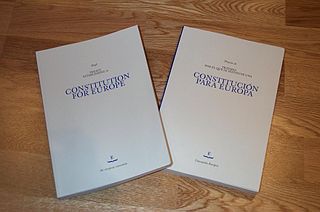
The Treaty establishing a Constitution for Europe was an unratified international treaty intended to create a consolidated constitution for the European Union (EU). It would have replaced the existing European Union treaties with a single text, given legal force to the Charter of Fundamental Rights, and expanded Qualified Majority Voting into policy areas which had previously been decided by unanimity among member states.
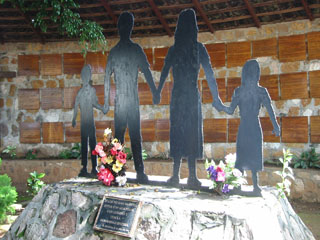
The American Convention on Human Rights, also known as the Pact of San José, is an international human rights instrument. It was adopted by many countries in the Western Hemisphere in San José, Costa Rica, on 22 November 1969. It came into force after the eleventh instrument of ratification was deposited on 18 July 1978.

The European Social Charter is a Council of Europe treaty which was opened for signature on October 18, 1961 and initially became effective on February 26, 1965, after West Germany had become the fifth of the 13 signing nations to ratify it. By 1991, 20 nations had ratified it.

The Convention on the Elimination of all Forms of Discrimination Against Women (CEDAW) is an international treaty adopted in 1979 by the United Nations General Assembly. Described as an international bill of rights for women, it was instituted on 3 September 1981 and has been ratified by 189 states. Over fifty countries that have ratified the Convention have done so subject to certain declarations, reservations, and objections, including 38 countries who rejected the enforcement article 29, which addresses means of settlement for disputes concerning the interpretation or application of the Convention. Australia's declaration noted the limitations on central government power resulting from its federal constitutional system. The United States and Palau have signed, but not ratified the treaty. The Holy See, Iran, Somalia, and Tonga are not signatories to CEDAW.

The Framework Convention for the Protection of National Minorities (FCNM) is a multilateral treaty of the Council of Europe aimed at protecting the rights of minorities. It came into effect in 1998 and by 2009 it had been ratified by 39 member states.
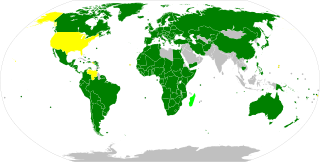
The Convention Relating to the Status of Refugees, also known as the 1951 Refugee Convention or the Geneva Convention of 28 July 1951, is a United Nations multilateral treaty that defines who a refugee is, and sets out the rights of individuals who are granted asylum and the responsibilities of nations that grant asylum. The Convention also sets out which people do not qualify as refugees, such as war criminals. The Convention also provides for some visa-free travel for holders of refugee travel documents issued under the convention.
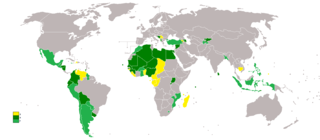
The International Convention on the Protection of the Rights of All Migrant Workers and Members of Their Families is a United Nations multilateral treaty governing the protection of migrant workers and families. Signed on 18 December 1990, it entered into force on 1 July 2003 after the threshold of 20 ratifying States was reached in March 2003. The Committee on Migrant Workers (CMW) monitors implementation of the convention, and is one of the seven UN-linked human rights treaty bodies. The convention applies as of August 2021 in 56 countries.
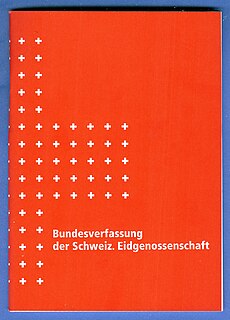
Human rights are largely respected in Switzerland, one of Europe's oldest democracies. Switzerland is often at or near the top in international rankings of civil liberties and political rights observance. Switzerland places human rights at the core of the nation's value system, as represented in its Federal Constitution. As described in its FDFA's Foreign Policy Strategy 2016-2019, the promotion of peace, mutual respect, equality and non-discrimination are central to the country's foreign relations.

The Convention Relating to the Status of Stateless Persons is a 1954 United Nations multilateral treaty that aims to protect stateless individuals.
The Convention on the Nationality of Married Women is an international convention passed by the United Nations General Assembly in 1957. It entered into force in 1958 and as of 2013 it has 74 state parties.

The Convention on the Rights of Persons with Disabilities is an international human rights treaty of the United Nations intended to protect the rights and dignity of persons with disabilities. Parties to the Convention are required to promote, protect, and ensure the full enjoyment of human rights by persons with disabilities and ensure that persons with disabilities enjoy full equality under the law. The Convention serves as a major catalyst in the global disability rights movement enabling a shift from viewing persons with disabilities as objects of charity, medical treatment and social protection towards viewing them as full and equal members of society, with human rights. The Convention was the first U.N. human rights treaty of the twenty-first century.
European labour law regulates basic transnational standards of employment and partnership at work in the European Union and countries adhering to the European Convention on Human Rights. In setting regulatory floors to competition to for job-creating investment within the Union, and in promoting a degree of employee consultation in the workplace, European labour law is viewed as a pillar of the "European social model". Despite wide variation in employment protection and related welfare provision between member states, a contrast is typically drawn with conditions in the United States.
The Convention on the association of the Netherlands Antilles with the European Economic Community is an international agreement amending the Treaty establishing the European Economic Community, with the aim of awarding OCT status to the Netherlands Antilles, which was a constituent country of the Kingdom of the Netherlands from 1954 until 2010. A full treaty revision was needed because Belgium, France, Germany, Italy, and Luxembourg wanted to add a protocol on the import of refined petroleum products from the Netherlands Antilles.

The Maritime Labour Convention (MLC) is an International Labour Organization convention, number 186, established in 2006 as the fourth pillar of international maritime law and embodies "all up-to-date standards of existing international maritime labour Conventions and Recommendations, as well as the fundamental principles to be found in other international labour Conventions". The other "pillars are the SOLAS, STCW and MARPOL. The treaties applies to all ships entering the harbours of parties to the treaty, as well as to all ships flying the flag of state party.

Portugal is generally considered as successful in upholding the civil liberties and protecting the human rights of its citizens. Portugal has proved to be determined in promoting and respecting human rights at an international and national level. The countries minister of Justice as of September 2018, Francisca Van Dunem, said that Portugal has had "a good track record" on human rights but violations still do persist.
Article 14 of the European Convention on Human Rights states that "The enjoyment of the rights and freedoms set forth in [the] Convention shall be secured without discrimination on any ground such as sex, race, colour, language, religion, political or other opinion, national or social origin, association with a national minority, property, birth or other status." Unlike the Universal Declaration of Human Rights, there is no general right to equal treatment, only in the areas covered by the Convention. However, the article covers an open-ended list of prohibited grounds for discrimination and has been expanded over time to include such grounds as sexual orientation. In the case law of the European Court of Human Rights, the interpretation of the article has expanded over time to include indirect discrimination. Protocol 12 to the European Convention on Human Rights expands on Article 14 to include a freestanding prohibition of discrimination in "any right set forth by law". Introduced in 2000, it has been ratified by 20 of 47 Council of Europe states as of 2021.